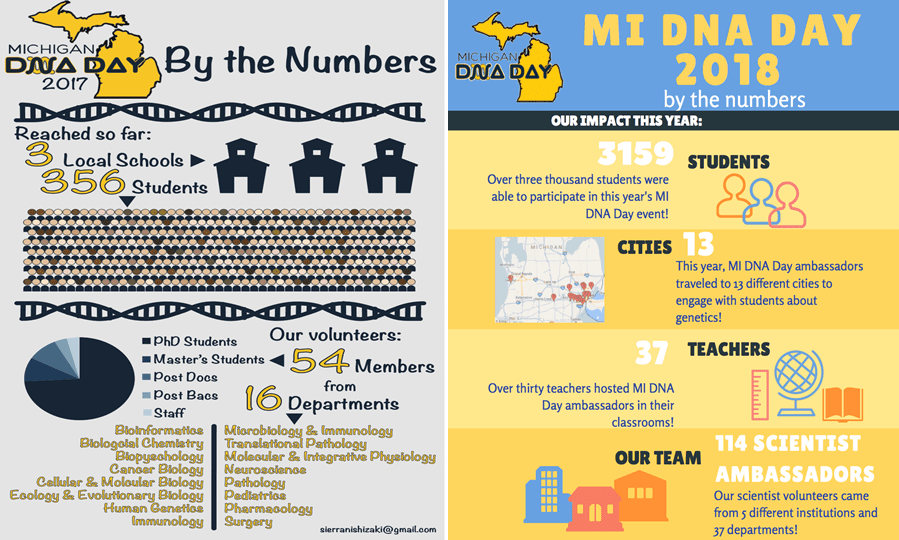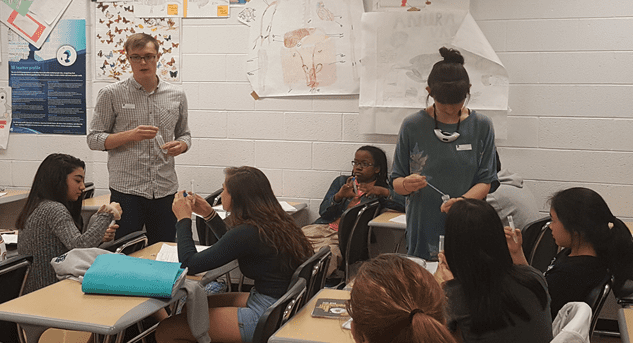Posted By: Ann Klinck, Communications and Marketing Assistant, ASHG
National DNA Day started in 2003 to commemorate the completion of the Human Genome Project and engage communities with science. Last month, ASHG hosted the webinar “Take Initiative: DNA Day Engagement and You,” which covered how to get involved, resources, and best practices.
Listeners were joined by moderator Maurice Godfrey, Incoming Chair of ASHG’s Information & Education Committee; Carla Easter, Chief of Education and Community Involvement at the National Human Genome Research Institute (NHGRI); and Christina Vallianatos, Founder and co-Director of Michigan DNA Day.
Importance of Science Engagement
Public engagement with science is imperative every day, but DNA Day provides the opportunity to make it a priority. Christina explained that her organization’s mission helps demystify science for students, and that “Many scientists’ careers aren’t linear. The simple act of awareness can help students know what other fields are out there in science outside of doctors and nurses.”

Ways to Get Involved
The speakers outlined numerous ways and resources for involvement:
National Events: Carla described larger DNA Day-related events that NHGRI oversees. Students are able to visit the NIH Campus and go on lab tours, and NHGRI facilitates interactive programming with the Smithsonian Institute, a lecture, and a seminar series. Past events are listed online, and 2019 events should be available soon.
Maurice encouraged listeners to get involved in ASHG’s Annual DNA Day Essay Contest. This year’s contest addresses the disclosure of a genetic diagnosis to one’s family. Participating students can win cash prizes and funding for their science programs at school.
Local Events: Christina’s program is localized to Michigan, but many other states offer events like it. If your state does not have an organization in place, scientists could simply reach out to their local schools and offer to speak with them for one class period. Teachers should also not be hesitant to reach out to professors at local colleges. Christina said, “Keep it simple! If you just make one contact at one school, it was worth the effort, because it will have an impact.”
Resources & Best Practices
The speakers provided several resources, including:
- Genome.gov offers a starter kit to move DNA Day programming further in your area. They also have a map to find events in your area and lists of interactive activities.
- The ASHG website has tips for the DNA Day Essay contest, lesson plans, and lists of outside resources.
- Michigan DNA Day’s website is a great place to start if you’re considering going into a classroom for DNA Day! There’s information for teachers, scientists, and students.
An overarching theme was to make your interactions as hands-on as possible. Christina says that when engaging with students, it should be “less about teaching and more about the interaction with science.” If students are given something physical to do, it’s more likely to stick with them.

Similarly, Maurice kept activities hands-on and interactive when developing a DNA Day program for the Omaha Zoo and Aquarium’s “Key to Diversity in Animals and People Festival,” a larger event that lasted a whole weekend.
Want to get involved or find more resources? Email ASHG at dnaday@ashg.org, NHGRI at dnaday@nih.gov, or Michigan DNA Day at midnaday@gmail.com.
Submissions for the ASHG DNA Day Essay Contest are due March 8, 2019! If you’re a member of ASHG and interested in getting involved in science engagement, sign up for the Genetics Engagement & Education Network or contact education@ashg.org.
